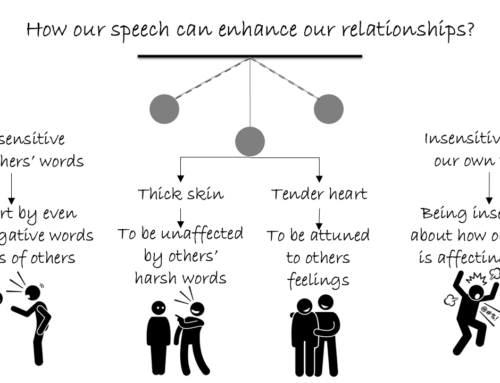Words are indispensable tools for communicating our ideas and feelings with others. These verbal tools have become increasingly critical in our hi-tech age of phones and emails that don’t allow the non-verbal forms of communication possible in direct, personal conversations.
Our words can act as windows or as walls. As windows, they give others a clear view of our thoughts and feelings, and facilitate understanding. As walls, they block others’ vision of our perspective, and breed misunderstandings.
How can we ensure that our words act as windows not walls? By applying the guidelines of the Bhagavad-gita (17.15) for tapping the power of words: speak words that are non-agitating, truthful, pleasing, beneficial and scripturally-based.
Let’s focus on the first guideline. When we speak in ways that agitate others, their emotions arise as instinctive reflexes for self-defense. This relegates their rational faculty to the background, leaving us with little or no facility for having an intelligent discussion. Soon the conversation degenerates into a shouting match or a name-calling competition. Over time, our words end as bricks in the Chinese wall that separates us.
To avoid such confrontations, do we have to suppress genuine facts or authentic concerns? No, because the same Gita verse also urges us to speak truthfully. The recommendation that we speak gently is meant to ensure that the form of our message doesn’t unnecessarily alienate others from its content.
How do we balance sensitiveness and truthfulness? By patience and prayerfulness. Before starting a high-stakes conversation, we can pause to gather our spiritual bearings; remind ourselves that this situation, like all situations, is ultimately an arrangement of Krishna to deepen our wisdom and devotion; and pray for his guidance. This devotional reorientation will empower us to use words that break walls and build windows.
Bhagavad Gita Chapter 17 Text 15
“Austerity of speech consists in speaking words that are truthful, pleasing, beneficial, and not agitating to others, and also in regularly reciting Vedic literature.”



Leave A Comment